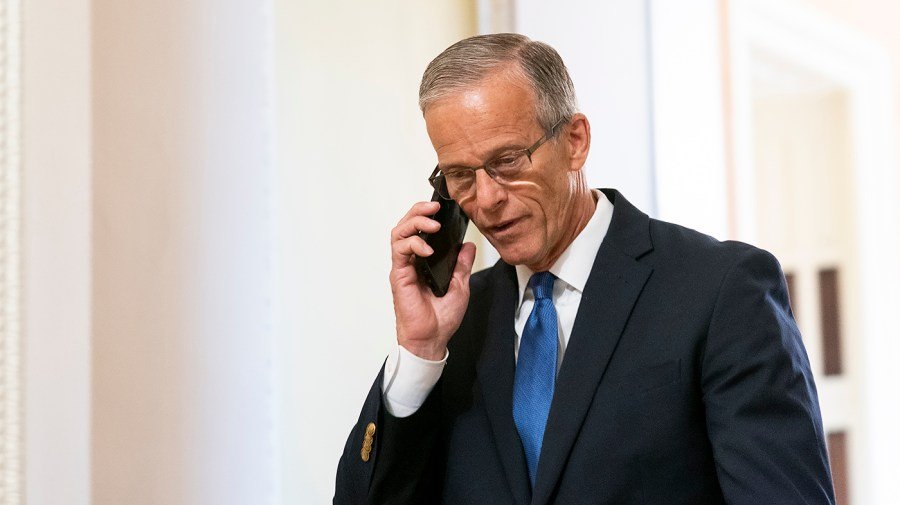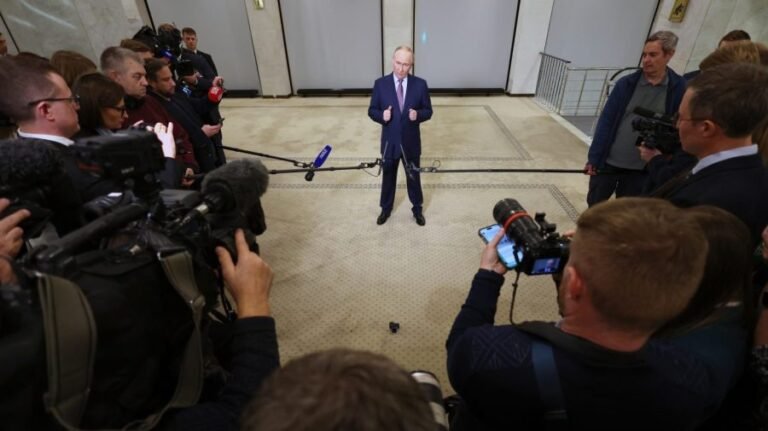
Senate Republicans on Thursday invoked the so-called “nuclear option” and changed the chamber’s rules to more easily confirm dozens of President Trump’s stalled sub-Cabinet nominees.
The 53-43 party-line vote came after negotiations intensified earlier Wednesday on a bipartisan deal to speed the nominations, but it failed to get enough Democratic support and Republicans moved forward with the partisan rule change.
“This … has to be fixed,” said Senate Majority Leader John Thune (R-S.D.), who was visibly frustrated on the floor.. “We offered you a proposal that had your fingerprints on it. It wasn’t even your fingerprints, you initiated it.”
“It’s time to move. It’s time to quit stalling. … It’s time to fix this place,” Thune continued.
The move allows Republicans to confirm nominees “en bloc” and came after weeks of discussion aimed at breaking through a Democratic blockade of the nominations.
The “nuclear option,” which allows the majority party to change the rules with a simple majority vote, is so called because it is seen as highly detrimental to bipartisanship. All told, the chamber needed four votes on Thursday to make the alteration.
The Republican plan was based on one offered by Sens. Amy Klobuchar (D-Minn.) and Angus King (I-Maine) in 2023. The Democratic proposal would have allowed “en bloc” consideration and passage of up to 10 nominees greenlighted by individual committees.
The bipartisan package that was being discussed would have increased the number under the Klobuchar-King bill from 10 to 15.
The GOP’s now-cemented move altered that blueprint to allow an unlimited number of nominees to be included in a single vote in order to clear the nearly 150 that are awaiting confirmation.
Democrats cried foul at the GOP’s decision, painting it as them running out of patience.
“We were achingly close to a deal, but I am afraid that my colleagues on the other side of the aisle have run out of patience,” said Sen. Brian Schatz (D-Hawaii) said on the floor, having pitched a unanimous consent request to keep the conversations going into Monday.
Republicans rejected that idea.
Thune shot back, saying that Democrats have had months and even years to consider the proposal, repeatedly noting that it was Democrats who first came up with the idea during Biden’s presidency. He also told reporters that he thought Democrats were stalling as Republicans had made clear that Thursday was their deadline to act.
“How much time is enough?” Thune fumed, going so far as to not yield the floor to a Democrat for a question during his remarks.
Sen. James Lankford (R-Okla.) told reporters that an “overwhelming majority” of Democrats were supportive of the bipartisan package, but was unsure who the holdouts were.
The first confirmation vote under the new rules is expected to take place next week and include 48 nominees, many of whom are slated for under or assistant secretary positions at various departments and agencies.
Also included are a half-dozen ambassador nominees, with Kimberly Guilfoyle (Greece) and Callista Gingrich (Switzerland and Liechtenstein) being among the most notable.
All of those included in this batch were voted out of committee with bipartisan support, with Republicans looking to make an example out of those who they believe should have been part of a bipartisan nominations deal they failed to strike before the August recess.
But the change would allow Republicans to move nominees with partisan backing in similar batches down the line.
The GOP’s plan would include choices to serve as U.S. attorneys.
Notably, the rule change does not apply to judicial nominees. They are still subject to the requisite two hours of floor consideration.
Also falling outside the scope of the “en bloc” push are Cabinet and Supreme Court nominees. They will still require 30 hours of consideration.
The Republican push stemmed from Democrats’ refusal to OK any Trump nominee, even those considered uncontroversial, via unanimous consent or voice vote. By contrast, more than 50 percent of nominees were approved by unanimous consent or voice vote during Trump’s first term and former President Biden’s tenure in office. Those figures hovered around 90 percent during former Presidents Obama and George W. Bush’s terms.
The two sides sought a deal on a slate of nominees before the August recess, with Trump scuttling the deal over what he deemed were steep Democratic demands.
The move also marks the latest chipping away of the chamber’s rules on nominations, which has been an ongoing theme for much of the past 15 years.
Former Senate Majority Leader Harry Reid (D-Nev.) kicked off the push in 2012 by lowering the threshold needed to approve executive branch and judicial nominations, sans Supreme Court choices.
Five years later, then Senate Majority Leader Mitch McConnell (R-Ky.) added Supreme Court nominees to those who require majority support. The Kentucky Republican also was in charge when the GOP lowered the amount of debate time for lower-level nominees from 30 hours to the current two-hour mark.


